- Home
- Taylor Caldwell
This Side of Innocence Page 5
This Side of Innocence Read online
Page 5
“Thank you—Uncle Jerome,” said Philip, with difficulty, and remembering that only the formality of the law made Jerome his uncle, and that, in reality, they were only second cousins. A film of color ran under the white skin of his cheeks. His small and fragile hands knotted together in his nervousness.
Jerome pulled a chair close to his father, and sat down, immediately forgetting the boy. Philip moved away, uncertainly, and sat down in the shadowy distance as unobtrusively as possible.
Mr. Lindsey studied his son’s face, and sighed at its bad color and at the marks and stains of dissipation under the bold hard eyes. He said gently: “You are looking well, Jerome. Tell me you are well.”
“Oh, I’m always well,” replied Jerome, with lightness. “And you, sir?”
Mr. Lindsey looked down at his hands, knotted with arthritis, and glanced at his crippled legs. He said: “It does not bother me much or often. But it makes it difficult to get about. However, I do not complain.”
He smiled at Jerome. There was no resemblance between the two. Mr. Lindsey had the spare pale countenance of the New Englander, and, indeed, his mother had been born in Boston. His was the lean and austere face of New England, intellectual and reserved, gently dignified, with large light-blue eyes full of astute gentleness and breeding. His white hair lay sleekly on his bony skull, above whittled temples and large, wellshaped ears. Once it had been quite yellow. His nose was thin and of Roman contour, and his wide straight mouth expressed compassion and shyness and humor. It had been his paternal grandmother who had given both to Jerome and Philip their almost Latin darkness. Not from this lady had come Mr. Lindsey’s calm and fortitude, his quiet courage and objective temperament.
He held his son’s restless and jewelled hand in his dry and paperlike fingers. He seemed unwilling to release it. “I am glad you are home, Jerome,” he said softly.
Home. Jerome looked at the fire. How he had always hated the still peace and tranquillity of this high and isolated big house, the dim order that prevailed in it, the contemplation that filled this library and the parlors! It had suffocated him. He wondered at this vaguely, now. Just at this moment, at least, it was warm and secure for him, dignified and welcoming, a shelter and a refuge. His face tightened. This was his home, filled now with interlopers. This was to be the inheritance of an unimaginative and detestable man, and a low-born trollop, and a miserable cripple! It was not to be endured. He must end it, and quickly. Did he wish to live here, among these pines, on this long and lonely hillside with only the wind and the hearth fires for company? Did he wish to immure himself here, with only a wretched village to enliven him, gazing eternally on these books, walking daily about the desolate grim grounds, looking through the windows of the sun room, and dining endlessly in the lofty panelled dining-room a-glitter with dim silver? Did he want this timeless peace, this heavy and cultured formality and routine? Something contracted in him, with a familiar depression and revulsion. Yet—the three repellent strangers must not live here, either, after his father was dead! It was not to be borne. He felt a stir of ancient hatred within him, a sickness.
He looked up. His father was regarding him steadfastly, with the strangest look, as if reading his thoughts. The old boy had this disconcerting gift of divining the emotions of others. Mr. Lindsey’s still, blue eyes had darkened as if with sadness.
He said: “How is the painting, Jerome?”
Jerome smiled with an effort. “Doing well. I don’t sell any, as you know. I won’t sell them. I give them to my friends, as always. By the way, I’ve brought two home; one for you and one for—for Alfred’s wedding present.” His smile became disagreeable. “I’ve brought back the miniature of my mother, from which I made the portrait. You’ll see them all, later.” He added absently: “I never liked that portrait of my mother, in the hall.”
The door opened, and Alfred and Amalie entered. Alfred paused on the threshold and looked long and searchingly at his uncle and cousin near the fire. Then, as if thrusting back an uneasy and unworthy thought, he lifted his head and followed Miss Maxwell as she approached the two. Jerome rose, with deliberate hesitation, and offered her a chair. She sat down gracefully, acknowledging his politeness with an ironical bend of her head. But she did not look at him. She began to gaze pleasantly at the fire as if she were alone, leaving Jerome, fuming against her, standing at her side.
Alfred said: “I have just heard from your man, Johnson, that you’ve not dined, Jerome, so I’ve ordered a small collation to be brought here to you, by the fire.”
“Thoughtful of you,” commented Jerome, politely. “But I’d prefer just a whiskey and soda.”
Alfred ignored this. “You are certain you would not care to change before dining?”
“Do I look so disgracefully bedraggled, then?” asked Jerome.
Alfred’s pale mouth drew together. “No, no, certainly not.”
Jerome sat down beside his father again. Alfred, slightly flushed, stirred up the fire. Amalie continued to regard it with pleasant abstraction. Mr. Lindsey, feeling the constraint, drew his watch from his pocket and glanced at it. “Almost nine,” he commented.
Amalie said idly, without moving her head: “Philip, isn’t it time for your bed?”
They had all forgotten Philip, lurking in the half-darkness at a distance. But at Amalie’s voice and question, he rose and came courteously towards the group at the fire. He bowed to Mr. Lindsey and to Jerome, then to his father and Amalie.
“Good night—Grandfather. Good night—Uncle Jerome. Good night, Papa. Good night, Miss Maxwell.” Jerome smiled irrepressibly at the order of the names, and looked at Philip with more interest. Did the poor humpback, then, resent this woman, also? But, to his surprise, Philip was gazing at Amalie with a curious expression, softened, eager. She lifted her hand and touched his thin arm, and instinctively he moved closer to her. Even when seated as she was, her strong purplish eyes were on a level with the boy’s, and the look in them was oddly gentle and understanding.
“Good night, dear Philip,” she said very gently.
She drew him to her then, with natural affection, and kissed his transparent cheek. He leaned against her shoulder for a brief shy moment; then, bowing again to them all, he drifted silently from the room. Amalie watched him go, with an unreadable thoughtfulness. But Alfred looked only at Amalie, and now his pale, amber-flecked eyes flared briefly but urgently with a terrible, suppressed passion. Seeing this, Jerome said to himself, with an inner grin: “Well, well, so that is how it is!”
He suddenly remembered someone else. “Where is my dear sister, Dorothea?”
Mr. Lindsey replied: “Dorothea is confined to her bed with a feverish cold, I am sorry to say. She insisted upon driving into town yesterday, and the weather was very bad. But, doubtless, she will be anxious to see you.”
“I have sent word to Dorothea,” said Alfred. “You are right, sir. She has asked to see Jerome, after he has dined.”
With his new acuteness about his family, Jerome saw that the look Alfred directed at Mr. Lindsey had no hypocrisy in its grave affection and gentleness, and that his propitiatory manner towards the older man was impelled by a genuine and solicitous regard, and a most profound respect. But Jerome was not touched by this. In earlier days, he had almost liked Alfred’s tenderness for his father, and had been relieved by it. It had absolved him, then, from any responsibility, had permitted him to go his own way, assured that his father was in adequate and protecting hands. But now he was secretly enraged. Something like jealousy boiled in him, and unreasonable outrage. He had always prided himself on being “completely objective” in his attitude towards others, but like almost all others who so pride themselves he was invariably the victim of his shameful emotions.
He sneered inwardly at Alfred, who was shaking up the cushions behind Mr. Lindsey. He watched the other man with the alertness and jealousy of a dog. Feeling his master’s reactions, Charlie, on Jerome’s knee, set up a renewed snarling. Mr. Lindsey put out
his hand and smoothed the dog’s silken head, and murmured to him. Then the old man sank back, with a word of thanks to his nephew. He looked at them all with frank affection, letting his eyes wander from face to face, as if he felt security and continuity about him. Only when his glance touched Amalie did it shrink into reserve for a moment, and then, as she smiled at him, he smiled in answer.
A servant brought in a large silver tray on which were arrayed a silver pot of tea, sugar and thick cream, and a rich meat pie. Jerome spread a large white napkin on his knee, and began to eat with candid appetite, laughing and talking inconsequentially to his father as he did so.
“You might know I’d arrive in the worst snowstorm of the season,” he said. “Damn those telegraph people, making that mistake!”
“They rarely make mistakes,” Alfred said with dignity. “I can’t understand it. I shall discuss it with them in a few days.”
Jerome shrugged. “Give them my personal regards, and rebuke them properly,” he said. Then he saw that Amalie was scrutinizing him ironically and with a cold smile. It was as if she understood all about him, his egotism, his brutal disregard for others, his carelessness, and all his follies and conceits and cruelties. He stopped eating to stare at her viciously. She was not quelled by his look. Languidly, she lifted her hand and touched the coral cameo at her throat with her long white fingers. We are two of a kind, she seemed to be saying to him, her eyes brilliant between her lashes. We understand each other.
He returned to the meat pie, hating her with fresh rage. Ah, my fine strumpet, he said to himself, we shall see what we shall see. So you enjoy the prospect of being mistress of my father’s house, my house, do you? You will lady it over the household, and queen it over the servants, and direct and rule and advise, eh? We shall see, and very soon, I promise you.
Amalie smiled faintly, turned her beautiful face to the fire.
Satisfied at length, Jerome allowed the tray to be taken from him. He asked for whiskey, and Alfred, with no comment, ordered it brought. Jerome poured a small glassful from the decanter, whisked a very little soda into the amber fluid. Then he paused. “Will no one join me?”
To his incredulous surprise, Amalie said tranquilly: “I will, thank you.” And stretched out her hand.
Jerome looked from her to Alfred, with an unpleasant grin. Alfred had colored, his dry skin suffused. Mr. Lindsey took Charlie upon his knee and began to stroke him. It was as if he had not heard.
“With pleasure,” said Jerome. He filled another glass, waiting for Amalie to protest the quantity. But she gave no word until the glass was almost as full as his own. Then she murmured. He filled the glass with the soda. She took it from him then, with a polite acknowledgment, and put the glass to her red lips. She sipped appreciatively.
Then Jerome glanced up at Alfred, with a virulent smile. But Alfred, in his chair, did not move or speak. His face was averted. Jerome leaned back in his chair in an attitude of enjoyment. “Excellent whiskey,” he commented. “You miss a great deal, Alfred, in your teetotalism.”
“I miss many other things, too,” replied Alfred, stiffly. His voice sounded muffled.
“And all of them pleasant,” said Jerome. He paused. “Is that not so, Miss Maxwell?”
She looked at him directly. “Yes, indeed,” she said.
Had she no discretion? Jerome asked himself. Had no one ever informed her that ladies did not drink whiskey, or any other spirits, in the presence of gentlemen, or at all? She was no fool: could she not at least pretend to some decorum, some gentility, if only for her own avaricious sake and prospects? Was she deliberately attempting to disillusion the fatuous Alfred, trying to alienate and disgust him? Or, did she know that her octopus hold on him was too secure to be shaken, and that she could with impunity flaunt her shamelesness in his Puritan face?
What sort of creature was this, utterly without refinement and decency? She was worse than an open trollop, for a trollop at least pretended to some manners and proper deportment when it was best for her. And, from the look of her, and her evident enjoyment, she was no stranger to whiskey, and this was no gesture of gauche bravado. She sipped her drink, relishing it like a man, brazenly, before his father.
“You find whiskey a stomachic, Miss Amalie?” he asked, with deep politeness. He felt, rather than saw, Alfred’s sudden suppressed movement.
“A most efficacious one,” she agreed.
“It makes life bearable,” Jerome suggested.
“Almost endurable,” she answered, in his own tone.
“But it must be taken regularly, for that salubrious effect,” went on Jerome, malevolently.
She withdrew the glass from her lips, and turned the full purple blaze of her eyes upon him, and he saw understanding contempt in them.
“I don’t know anything about that,” she said quietly. “But doubtless you could tell me.”
Mr. Lindsey raised his head and looked slowly from his son to the young woman. His gray thin brows drew together just slightly.
Jerome said: “Then, you do not need to escape from the exigencies of life very often, Miss Amalie?”
She regarded him in silence, and her lip curled. “I am no coward,” she said. “But there are others who must escape constantly. Is that not so, Mr. Lindsey?”
Jerome did not answer. He turned the glass about in his fingers. Then he looked at Alfred, and meeting the latter’s distressed eye, he laughed in open but silent mirth. Alfred pulled himself upright in his chair; his eye narrowed upon Jerome, and one suddenly saw that he could become coldly violent and ruthless when necessary. All his inherent dislike, his involuntary and suppressed hatred, for his cousin, shone like lightning for a moment on his face.
Damn you, thought Jerome, not shrinking from that look, but returning it with one of virulent disdain, I am not gratuitously insulting your love. I am only trying to reveal to your stupidity the full extent of her shamelessness.
Mr. Lindsey said quietly: “I have never subscribed to the foolish belief that females are different from the other half of humanity. Woman begotten of man shares his proclivities. And man is born of woman. If Miss Amalie wishes a glass of whiskey, or of anything else, occasionally, that is entirely her own affair, and I wish her enjoyment. I have changed my mind, Jerome. I believe I will join you and Miss Amalie in a toast to the coming wedding.”
His manner was stern and cold and imperative. He looked at Jerome fixedly, then slowly turned his full blue eyes upon Alfred, and his manner implied a certain aristocratic censoriousness. Jerome, in the sudden silence, filled a glass for his father, extended it to him with an elaborate bow. But Mr. Lindsey was not to be placated. His breath came a little faster. He held the glass high.
“To my dear son, Alfred, and to a very charming and understanding Jady,” he said. He inclined his head to Amalie, whose face had changed, becoming sad and tired.
“To a very happy marriage,” said Jerome, gallantly, smiling full at the young woman, and then at his father. He and his father drank the whiskey.
Then Alfred said, in a strained voice: “Father—you know your physician has forbidden spirits—”
Mr. Lindsey replied composedly: “There are times when a man must drink for the sake of his soul, and for the sake of other equally important things.”
Jerome rose and bowed deeply to all of them. “And now, if you will excuse me, I think I shall run up to see my sister. We have much to discuss.” He paused. “After all, we have not seen each other for a long time.”
Amalie held her glass near her lips. Her eyes were almost black in the lamplight. “Give her my regards, please,” she said. “And tell her, please, that I wish her much pleasure—in your discussions.”
CHAPTER FIVE
Jerome went up the great oaken staircase, whistling softly and abstractedly, stroking the head of the dog, which was tucked under his right arm. He had always despised the “stuffiness” of these somber halls, this massive stairway; but with his newly aware eyes he suddenly admired the
ir Elizabethan atmosphere, their grave dignity and strength. His taste had always run more to the delicate and the airy, the ultrarefined and exquisite, and he had found the solidity of the old house, which his great-grandparents had built, oppressive and too heavy. But now the house felt secure in spite of its somberness, impregnable despite its darkness and massiveness. It was perversely dear to him, and his new jealousy and outrage made him glance about him, frowning and grim-eyed.
No! No stranger should live within these halls, and lord it over this household! He thought of the stony-lipped Alfred and his “trollop,” and his face became ugly in the dim lamplight. Strangers, both; interlopers, both. So, they would fill his father’s house with alien brats, would they? Not so long as he, Jerome Lindsey, had a claim here.
He paused on the second landing. Did he have a claim? But, surely to God, his father knew him, knew his volatile nature too well to have taken him seriously when he had declared that he wanted nothing of this house, and that nothing would ever induce him to live here! He, himself, distrusted the capriciousness of his own temperament, and he was always obscurely annoyed whenever anyone took him at his word, especially when it was later very inconvenient, or when he had changed his mind. Yet, he could not go to his father and say sheepishly: “I trust you did not take me seriously? After all, I spoke thoughtlessly, when I was young and stupid.” It was damned embarrassing. And even now, he did not know exactly what he wanted! He only knew that instead of despising Alfred, and indulgently deriding him, he now loathed him, and felt in himself a dark and powerful repulsion and hatred. Though fond of analyzing others, and quite subtle and astute in estimating and dissecting their natures, he had never known anything, really, of himself.

 Testimony of Two Men
Testimony of Two Men Wicked Angel
Wicked Angel The Arm and the Darkness
The Arm and the Darkness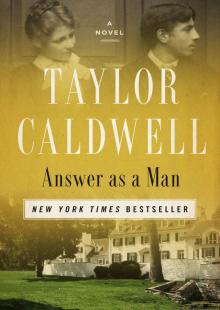 Answer as a Man
Answer as a Man Grandmother and the Priests
Grandmother and the Priests On Growing Up Tough: An Irreverent Memoir
On Growing Up Tough: An Irreverent Memoir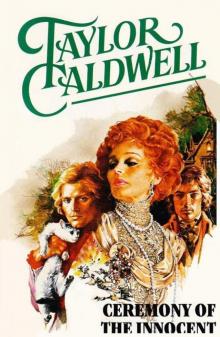 Ceremony of the Innocent
Ceremony of the Innocent The Listener
The Listener Bright Flows the River
Bright Flows the River The Earth Is the Lord's
The Earth Is the Lord's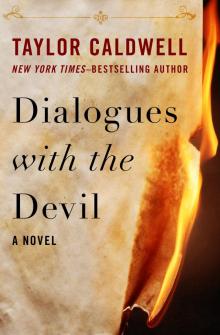 Dialogues With the Devil
Dialogues With the Devil A Tender Victory
A Tender Victory This Side of Innocence
This Side of Innocence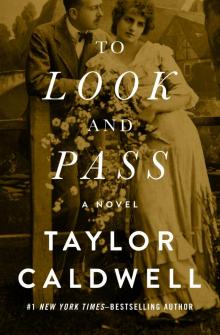 To Look and Pass
To Look and Pass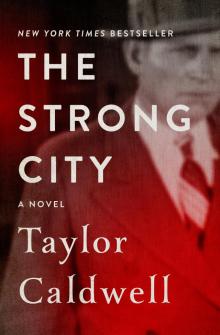 The Strong City
The Strong City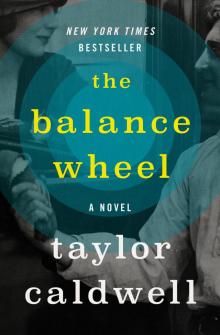 Balance Wheel
Balance Wheel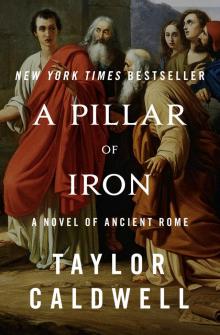 A Pillar of Iron: A Novel of Ancient Rome
A Pillar of Iron: A Novel of Ancient Rome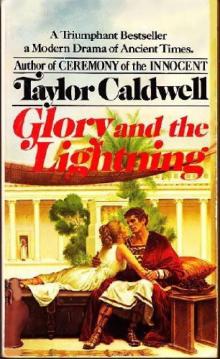 Glory and the Lightning
Glory and the Lightning Dear and Glorious Physician
Dear and Glorious Physician The Wide House
The Wide House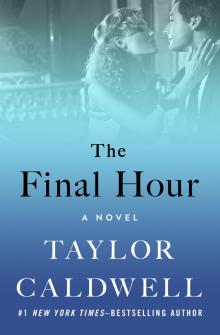 The Final Hour
The Final Hour Never Victorious, Never Defeated
Never Victorious, Never Defeated Unto All Men
Unto All Men The Turnbulls
The Turnbulls Your Sins and Mine: The Terrifying Fable of a World Without Faith
Your Sins and Mine: The Terrifying Fable of a World Without Faith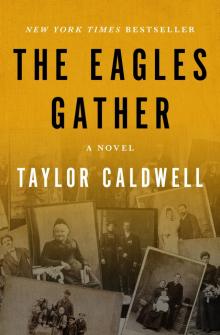 The Eagles Gather
The Eagles Gather Let Love Come Last
Let Love Come Last The Devil's Advocate: The Epic Novel of One Man's Fight to Save America From Tyranny
The Devil's Advocate: The Epic Novel of One Man's Fight to Save America From Tyranny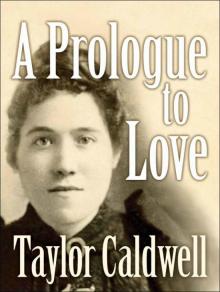 A Prologue to Love
A Prologue to Love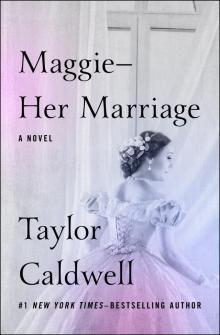 Maggie: Her Marriage
Maggie: Her Marriage The Late Clara Beame
The Late Clara Beame Melissa
Melissa Great Lion of God
Great Lion of God Captains and the Kings
Captains and the Kings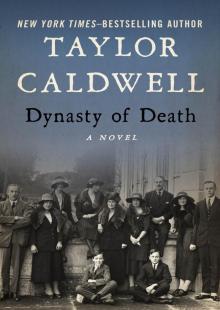 Dynasty of Death
Dynasty of Death No One Hears but Him
No One Hears but Him The Sound of Thunder
The Sound of Thunder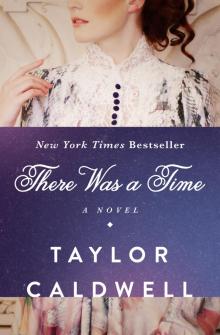 There Was a Time
There Was a Time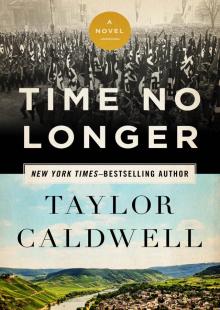 Time No Longer
Time No Longer I, Judas
I, Judas The Devil's Advocate
The Devil's Advocate The Romance of Atlantis
The Romance of Atlantis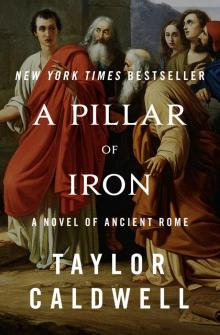 A Pillar of Iron
A Pillar of Iron On Growing Up Tough
On Growing Up Tough Your Sins and Mine
Your Sins and Mine